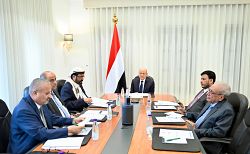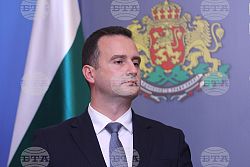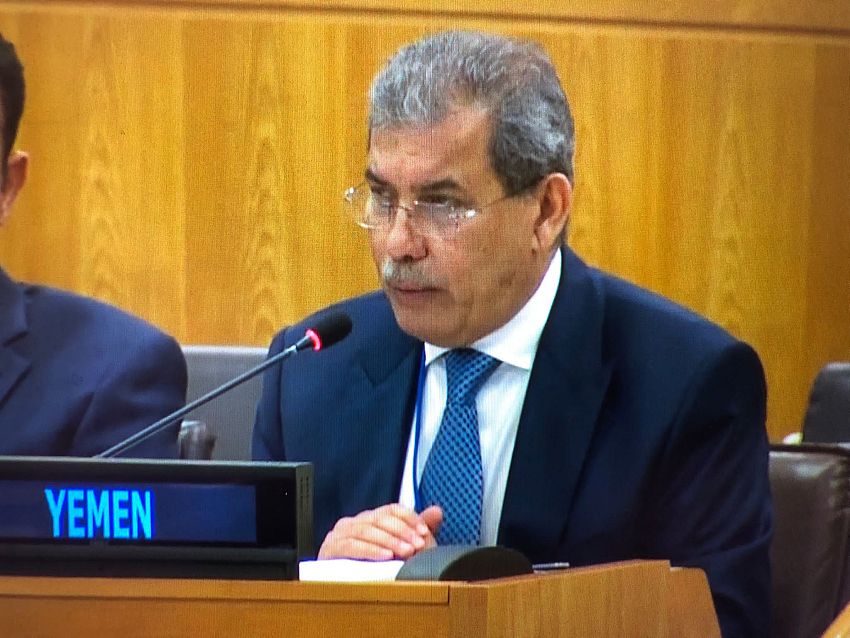
Leadership Council listens to Prime Minister's report on progress of reform process, welcomes findings of expert team's report
. The Presidential Leadership Council (PLC( held a meeting today, Sunday, chaired by His Excellency President Dr. Rashad al-Alimi, Chairman of the Council, with the attendance of its members Sultan al-Arada, Dr. Abdullah al-Alimi, and via video call Abdul-Rahman al-Mahrami and Othman Majli, while Aidaroos al-Zubaidi, Tariq Saleh and Faraj al-Bahsni were absent with an excuse.

Bulgaria's Kozloduy Nuclear Plant Partners with 4 Universities to Train Future Staff
Kozloduy Nuclear Power Plant (NPP) - New Builds EAD signed framework agreements with four Bulgarian universities to collaborate on staffing future projects, attended by Energy Minister Zhecho Stankov and Education Minister Krasimir Valchev.

More than 1,500 flights canceled in U.S. amid ongoing government shutdown
Airlines canceled more than 1,500 flights in the United States today, Monday, for the fourth consecutive day, amid continued government flight reductions and the absence of air traffic control staff.

Croatia Qualifies for 2026 World Cup with Thrilling Win Over Faroe Islands
Croatia secured a spot in the 2026 World Cup in the United States, Mexico, and Canada after defeating the Faroe Islands 3-1.
Last Update: ،
2025/11/16
Time
11:16:30
Latest News:
 Deputy Speaker of Shura Council Meets Chinese Chargé d'Affaires
Deputy Speaker of Shura Council Meets Chinese Chargé d'Affaires
 Fourth Phase of Artificial Joint Implant Project Concludes at Marib Hospital
Fourth Phase of Artificial Joint Implant Project Concludes at Marib Hospital
 Yemen Participates in 12th Arab Constitutional Courts Union Meeting in Rabat
Yemen Participates in 12th Arab Constitutional Courts Union Meeting in Rabat
 Ambassador Al-Manhali Meets UAE Deputy Minister of Defense.
Ambassador Al-Manhali Meets UAE Deputy Minister of Defense.
 Minister of Water Discusses Support for Adaptation Projects in Yemen with Green Climate Fund
Minister of Water Discusses Support for Adaptation Projects in Yemen with Green Climate Fund
Latest News:
 Deputy Speaker of Shura Council Meets Chinese Chargé d'Affaires
Deputy Speaker of Shura Council Meets Chinese Chargé d'Affaires
 Fourth Phase of Artificial Joint Implant Project Concludes at Marib Hospital
Fourth Phase of Artificial Joint Implant Project Concludes at Marib Hospital
 Yemen Participates in 12th Arab Constitutional Courts Union Meeting in Rabat
Yemen Participates in 12th Arab Constitutional Courts Union Meeting in Rabat
 Ambassador Al-Manhali Meets UAE Deputy Minister of Defense.
Ambassador Al-Manhali Meets UAE Deputy Minister of Defense.
 Minister of Water Discusses Support for Adaptation Projects in Yemen with Green Climate Fund
Minister of Water Discusses Support for Adaptation Projects in Yemen with Green Climate Fund
Yemen renews call to International Community for support to resume oil, gas exports
[14/05/2025 07:17]
NEW YORK - SABA
The Yemeni government has reiterated its call to the international community and the Security Council to provide assistance in finding possible ways to resume oil and gas exports as a crucial step towards achieving stability and economic recovery.
This would enable the Yemeni people to benefit from their natural resources and reduce reliance on external economic and humanitarian aid.
This statement was made during a speech by Yemen's Permanent Representative to the United Nations Ambassador Abdullah al-Sa'adi on Wednesday at the Security Council's open session regarding the situation in the Middle East (Yemen).
"The ongoing threats from the Iran-backed Houthi terrorist militias and the continued halt of oil and gas exports are accelerating the catastrophic repercussions on society, exacerbating economic and humanitarian conditions, disrupting all service, health, and educational sectors, and narrowing the livelihoods of Yemenis," he said.
Ambassador al-Sa'adi emphasized that the Yemeni government is making significant efforts to continue implementing comprehensive reform measures to address the enormous challenges in economic, financial, monetary, administrative and humanitarian aspects, fulfilling its commitments, activating governance mechanisms, enhancing transparency principles, combating corruption, working with standards of efficiency and integrity and achieving economic stability to improve economic and humanitarian conditions.
However, he said, the current and significant challenges facing the Yemeni government include a severe shortage of the main public revenues on which the state budget relies.
Ambassador al-Sa'adi pointed out that the targeting of oil export facilities by Houthi militias and the complete halt of oil and gas exports have disrupted the most important economic sector in the Republic of Yemen, where oil exports contribute approximately 90% of total merchandise exports and 80% of total state budget revenues.
The cessation of oil and gas production and export has deprived the state of crucial sources of hard currency that feed external foreign exchange reserves, finance imports of food and non-food goods, and support exchange rate stability, he said.
He stressed that the decline in public resources threatens the government's ability to meet its financial obligations regarding public service expenditures, particularly electricity and employee salaries.
He noted that the impact of halting oil exports is not limited to the government losing additional financial resources, estimated at about $7.5 billion since October 2022, but has also led to a deterioration in the national currency's value, weakened the government's ability to intervene in foreign exchange markets, provide the necessary currency for importing goods, ensure basic services and pay employee salaries regularly, in addition to declining economic, social and development indicators.
He renewed the Presidential Leadership Council and the Yemeni government's determination to end the war and achieve a comprehensive and lasting peace based on the agreed political solution references, led by the UN Security Council Resolution 2216.
He expressed regret that all this commitment, along with regional and international efforts, and those of the UN through its Special Envoy to Yemen aimed at resolving this crisis, have been met with obstinacy and rejection from the Iran-backed Houthi terrorist militias.
These militias have sought to undermine all initiatives over the past years and have proven through experience that they do not believe in peace or dialogue, do not adhere to agreements, and do not respect the efforts to halt their war while refusing to engage sincerely and in good faith in the political process.
Yemen's Representative to the UN Abdullah al-Sa'adi stated: "The militias seek to prolong their war against the Yemeni people, destroy their capabilities, deepen their suffering, and escalate violence while expanding oppression and violations in their controlled areas."
They threaten regional and international interests, international shipping routes, and vessels in the Red Sea, Bab al-Mandab Strait, and Gulf of Aden. They persist in their policy of starving and impoverishing Yemenis, destroying all aspects of their lives, and extinguishing their hopes for a normal and dignified life."
It was noted that the Houthi militias see the Yemeni people only as fuel for their wars that serve their interests and destructive agenda, turning Yemenis into tools to implement agendas unrelated to the history, culture, and civilization of this ancient people. They exploit the blood of Yemenis to achieve military, political, and media gains.
The ambassador pointed out that the militias have plunged the Yemeni citizen into poverty and hunger, destroying Yemen's economic and cultural resources and national fabric. This includes imposing a systematic economic blockade on the Yemeni government and people through their terrorist actions, targeting oil facilities and ports, obstructing humanitarian aid to those in need, and seizing employee salaries to fund their war against Yemenis.
Ambassador al-Sa'adi emphasized that the Presidential Leadership Council and the Yemeni government hold the Houthi terrorist militias fully responsible for the destruction of the Yemeni people's resources, infrastructure, and the harm caused to their interests and national security, endangering the lives and livelihoods of Yemenis, dragging Yemen into endless wars, and provoking international community responses and military actions in regional waters as a predictable reaction to deter their threats and attacks on international shipping routes and the global economy.
He confirmed that the government of Yemen has reiterated that the success of any political rapprochement to achieve stability and peace in Yemen requires understanding the root causes of this conflict, the nature and reality of the Houthi militias and not overlooking their practices and their sabotage of all efforts and initiatives to end this devastating war. It also calls for putting an end to Iranian influence and interventions in Yemen and the region, which undermine regional and international security, and for collective action to deter the threat posed by the Houthi militias and to designate them as a foreign terrorist organization.
Ambassador al-Sa'adi urged the international community and all partners to support the classification of these militias as a foreign terrorist organization, given the threats they pose to the security and stability of Yemen, the region, and the world. He called for strict measures to dry up their funding and arms supply, emphasizing that silence and neglect in confronting these threats and acts of terrorism will lead to further escalation, violence, extortion, and chaos in Yemen and the region.
He continued, "For nearly a year, we have witnessed unprecedented campaigns of abductions and arbitrary arrests carried out by the Houthi terrorist militias against UN staff, international organizations operating in Yemen, civil society members, and diplomatic mission employees, without the UN or this esteemed council taking any effective and tangible actions to secure their unconditional release."
A year has passed, and the humanitarian and relief community in Houthi-controlled areas feels betrayed and increasingly fearful while UN agencies continue to operate as usual, he added.
He stated: "Impunity and the lack of serious action regarding the Houthi militias' disregard for the safety of UN staff and international organizations encourage these militias to continue committing further violations. We remind once again that the Yemeni government warns that these militias will not cease to extort the international and humanitarian community, and they will carry out more arrests and violations against civilians and humanitarian workers, along with mistreating the forcibly detained in their prisons."
Ambassador al-Sa'adi reiterated the Yemeni government's demand to relocate the offices of UN agencies and international organizations working in Yemen to the temporary capital, Aden, to ensure a safe and stable environment for humanitarian and relief work without any obstacles, and to limit the looting practiced by the Houthi militias and their exploitation of humanitarian aid for their so-called war effort against the Yemeni people.
He warned, "In light of the ongoing deterioration of the economic and humanitarian situation imposed by the Houthi militias, the internal displacement crisis, climate-related disasters and the spread of epidemics and diseases, the widening gap between rising humanitarian needs and the necessary funding to alleviate them threatens to put millions of Yemenis at risk and deprive them of essential assistance for survival, such as food, healthcare, and protection services."
This situation foreshadows an increase in acute food insecurity and malnutrition rates, especially among women, children, and the elderly, particularly given the obstacles and interventions faced by humanitarian organizations in Houthi-controlled areas that divert aid away from those in need.
There is no doubt that women and children are the most affected groups by the conflict, as Yemeni women in Houthi-controlled areas face unprecedented crimes and violations, he said.
The Houthi militias commit abductions and enforced disappearances against them, subjecting them to violence and extortion, as well as sexual harassment, assault, psychological and physical torture, and imposing strict measures and restrictions to limit their movement and deprive them of their basic rights to quality education, work outside the home, political and social participation, and contributing to the development and enlightenment of society, he said.
He concluded by saying: "While we appreciate the efforts made to alleviate the humanitarian suffering in Yemen, we appeal to the international community and the UN to enhance the support provided for humanitarian response in Yemen and to bridge the existing funding gap, especially in light of the increasing humanitarian needs."
Key words:
" Ambassador - Ambassador - administrative - Representative - infrastructure - classification - disappearances - understanding - comprehensive - rapprochement - Leadership Council listens to Prime Minister's report on progress of reform process, welcomes findings of expert team's report
Leadership Council listens to Prime Minister's report on progress of reform process, welcomes findings of expert team's report Deputy Speaker of Shura Council Meets Chinese Chargé d'Affaires
Deputy Speaker of Shura Council Meets Chinese Chargé d'Affaires Fourth Phase of Artificial Joint Implant Project Concludes at Marib Hospital
Fourth Phase of Artificial Joint Implant Project Concludes at Marib Hospital Yemen Participates in 12th Arab Constitutional Courts Union Meeting in Rabat
Yemen Participates in 12th Arab Constitutional Courts Union Meeting in Rabat Ambassador Al-Manhali Meets UAE Deputy Minister of Defense.
Ambassador Al-Manhali Meets UAE Deputy Minister of Defense. Minister of Water Discusses Support for Adaptation Projects in Yemen with Green Climate Fund
Minister of Water Discusses Support for Adaptation Projects in Yemen with Green Climate Fund Prime Minister Witnesses Signing Memorandum of Understanding to Implement Power Projects in Yemen
Prime Minister Witnesses Signing Memorandum of Understanding to Implement Power Projects in Yemen Taiz Governor Discusses Development Interventions with Regional Director of Japan’s “ACCEPT” Organization
Taiz Governor Discusses Development Interventions with Regional Director of Japan’s “ACCEPT” Organization Prime Minister Affirms Commitment to Expanding Cooperation with France
Prime Minister Affirms Commitment to Expanding Cooperation with France Agriculture Minister appreciates Dutch support for Yemen
Agriculture Minister appreciates Dutch support for Yemen


